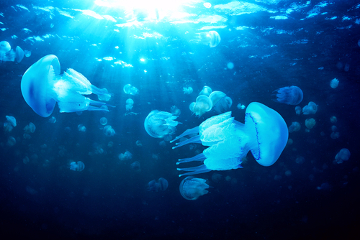I'm sure you've heard of the jellyfish, animals with an almost transparent gelatinous body. these curious animals invertebrates belong to the group of cnidarians and are responsible for several accidents every year on beaches in Brazil and around the world.
Jellyfish have an umbrella-shaped body and have a mouth in the lower portion of the body bordered by tentacles that help, mainly, in capturing food and defending it. Some species have tentacles that can reach up to four meters.
Jellyfish have the shape of a jellyfish and are able to swim freely in the sea, being often carried by the tides and even by the force of the winds. These gelatinous animals are very important ecologically, since play an important role in the marine food chain, serving as food, for example, for sea turtles.
These animals have cells with toxic substances used in capturing their prey. The toxic fluid that causes severe pain is found inside stinging structures called nematocysts, located mainly in the tentacles.

Jellyfish accidents can trigger several unpleasant reactions
Contact with substances produced by jellyfish does not only cause pain. In some people, it can cause vomiting, headaches and abdominal pain, a feeling of constriction in the throat, paralysis, seizures, cramps, respiratory failure and cardiac arrhythmias. On the skin, blisters, vesicles and even necrosis may appear. Scars from contact with jellyfish can be permanent.
If you come into contact with a jellyfish, it is important to wash the area immediately with seawater to try to remove the nematocysts. It is essential not to use fresh water or alcohol, as this action causes the nematocysts to be fired. Another important point is to apply vinegar in compresses or wash the area with the product to deactivate these stinging cells.
In Brazil, there are not many species of jellyfish that trigger serious cases, however, dangerous symptoms can arise. If you experience difficulty breathing and a condition of intense malaise, seek medical attention immediately.
Attention: Avoid entering places with large amounts of jellyfish and, when you see a dead animal on the beach, avoid touching it.
By Ma. Vanessa dos Santos


